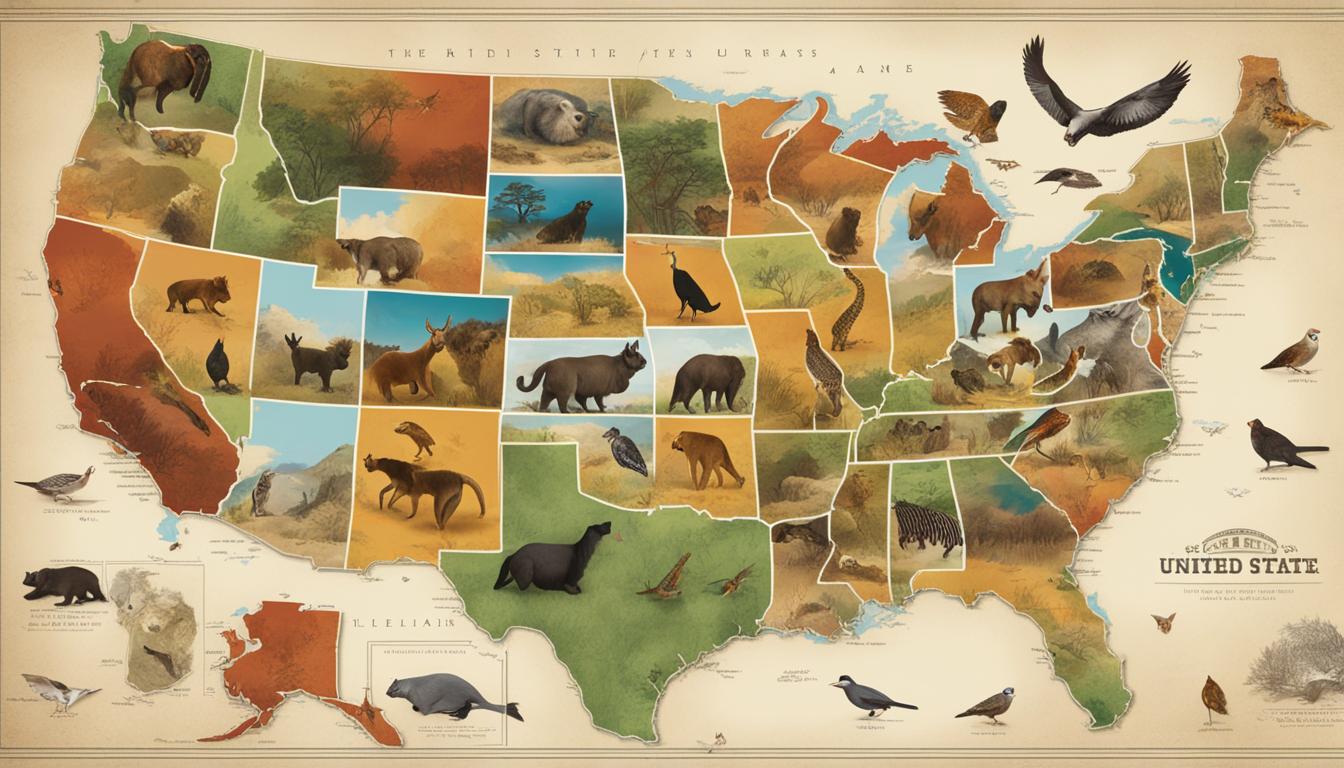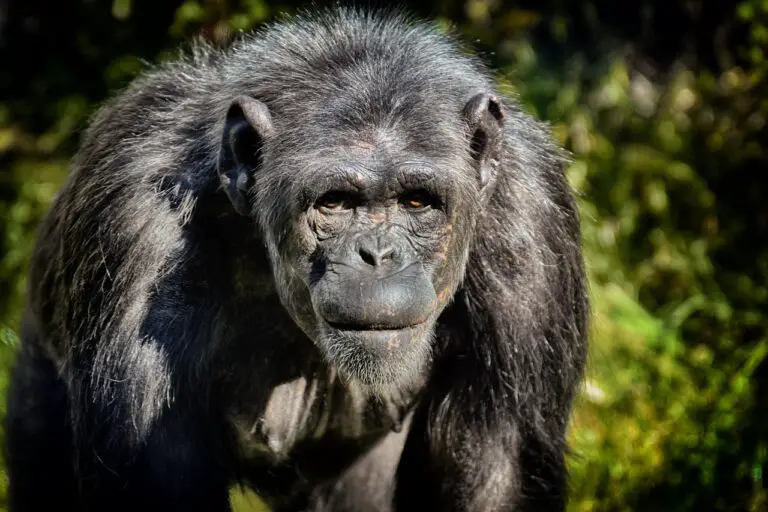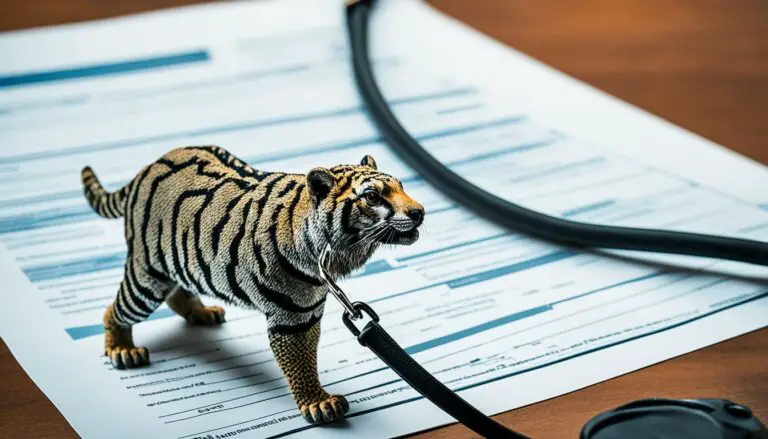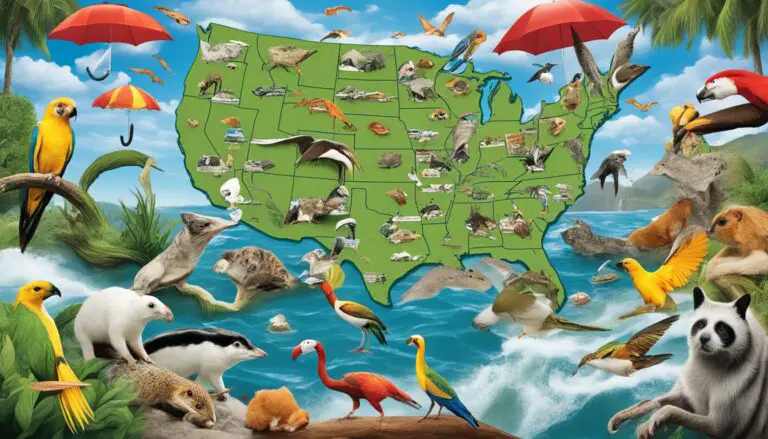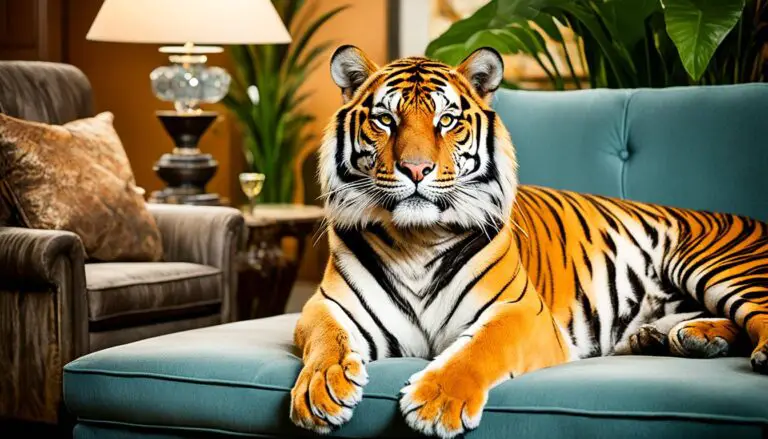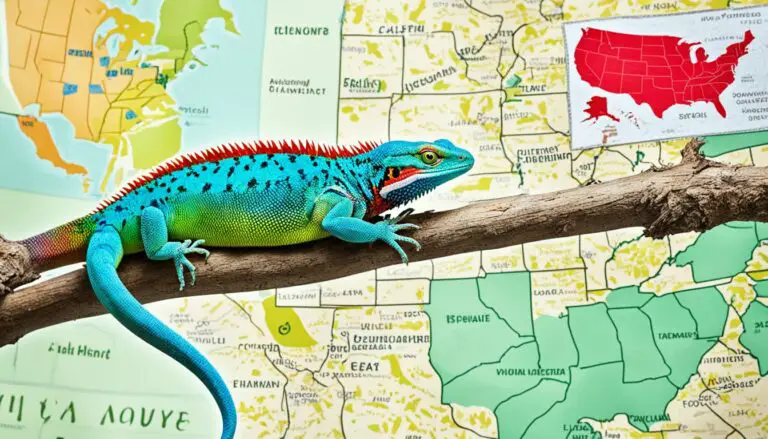Illegal Exotic Pets by State: Law Guide
Each state in the United States has laws that regulate the ownership and possession of exotic pets. These laws can be complex and vary from state to state. It is crucial for individuals to understand the specific regulations in their state to avoid legal issues and ensure the well-being of these unique animals. This comprehensive guide will provide an overview of the laws regarding illegal exotic pets in each state, helping pet owners stay informed and compliant with the regulations.
Key Takeaways:
- Each state in the United States has specific laws and regulations regarding illegal exotic pets.
- It is essential for pet owners to understand and comply with these regulations to avoid legal issues.
- This guide will provide an overview of the laws in each state, helping individuals navigate the complexity of illegal exotic pets.
- Staying informed about the laws and regulations can ensure responsible exotic pet ownership.
- Understanding the environmental and legal implications of owning illegal exotic pets is crucial for the protection of biodiversity.
Understanding Exotic Pet Regulations in the U.S.
Exotic pet ownership in the United States is subject to a complex web of regulations that vary from state to state. The specific laws and restrictions surrounding exotic pets are influenced by a variety of factors, including the state’s wildlife populations, concerns for public safety, and efforts to conserve the environment. It is crucial for individuals interested in owning exotic pets to understand and comply with these regulations to ensure the wellbeing of the animals and avoid legal issues.
Why State Laws on Exotic Animals Vary
State laws on exotic animals vary due to a range of factors, including the unique wildlife species found within each state’s borders. Some states may have thriving populations of certain animals and therefore have different regulations to protect these species. Public safety concerns also play a significant role, as some exotic animals may pose risks to human health and safety. Additionally, states may have varying priorities when it comes to environmental conservation, leading to differences in regulations regarding exotic animal ownership.
The Role of Federal Legislation in Exotic Animal Ownership
Federal legislation can also influence the regulations surrounding exotic animal ownership across the country. The United States has several laws in place to regulate the trade and possession of exotic animals, such as the Lacey Act. These federal laws are designed to protect wildlife and prevent the illegal trafficking of animals. While federal legislation sets a baseline for regulations, states may have additional rules and restrictions regarding exotic pet ownership.
How to Stay Informed About Changing Wildlife Legislation
Wildlife legislation can change over time, and it is crucial for individuals to stay informed about these changes to ensure compliance. One way to stay updated is to regularly check the websites of relevant state agencies, such as the Department of Natural Resources, for any updates or announcements regarding exotic pet regulations. Additionally, joining local exotic pet owner groups or seeking guidance from reputable animal welfare organizations can provide valuable insights into current and upcoming changes in wildlife legislation.
Illegal Exotic Pets by State: Navigating the Complexity
Navigating the complexity of illegal exotic pets by state can be challenging. With different regulations and restrictions in each state, individuals must understand the specific laws in their area. This section will provide guidance on how to navigate the complexity of illegal exotic pets, ensuring individuals have the necessary information to make informed decisions about pet ownership.
Understanding and complying with the laws and regulations regarding exotic pet ownership is crucial for individuals who are interested in owning these unique animals. However, navigating the complex landscape of illegal exotic pets can be daunting, especially when each state has its own set of regulations.
To successfully navigate the complexity of illegal exotic pets, it is important to start by researching and understanding the laws in your specific state. This involves familiarizing yourself with the specific exotic pet regulations, prohibited species lists, and any permit requirements that may be in place.
An invaluable resource in this process is the state-by-state guide on illegal exotic pets. This comprehensive guide provides detailed information on the exotic pet laws in each state, including the specific species that are prohibited, permit requirements, and any relevant restrictions.
Additionally, it is important to reach out to local authorities and organizations that specialize in exotic pet regulations. These individuals can provide up-to-date information and guidance on navigating the laws in your area. It is also recommended to consult with legal professionals who specialize in exotic pet ownership to ensure that you are fully aware of your rights and responsibilities.
By adequately navigating the complexity of illegal exotic pets, individuals can avoid legal issues and ensure the welfare of both themselves and the animals they may wish to keep as pets.
State-by-State Guide on Prohibited Exotic Pets
Each state in the United States has its own specific laws and regulations regarding the ownership and possession of exotic pets. It’s important for individuals to understand these laws to avoid legal issues and ensure the responsible ownership of these animals. In this section, we will provide a comprehensive state-by-state guide on prohibited exotic pets, highlighting notable examples from three states: Alabama, California, and Florida.
Alabama’s Exotic Animal Ownership Laws
In Alabama, the ownership of certain exotic animals is strictly regulated. The state classifies animals into three categories: Class I, Class II, and Class III. Class I animals, such as lions, tigers, bears, and chimpanzees, are prohibited from private ownership. Class II animals, including wolves, cougars, and certain reptiles, require a special permit for ownership. Class III animals, such as certain non-venomous snakes and primates, can be owned without a permit but are subject to restrictions. It is important for individuals in Alabama to familiarize themselves with these classifications and permits to ensure compliance with the state’s regulations.

California’s Strict Wildlife Restrictions
California has some of the strictest regulations on exotic pet ownership in the United States. The state prohibits the ownership of a wide range of exotic animals, including large cats, wolves, primates, venomous snakes, and certain reptiles. In order to possess a restricted species in California, individuals must obtain a permit from the Department of Fish and Wildlife and meet specific requirements. The state’s stringent wildlife restrictions are in place to protect public safety and prevent the release or escape of exotic animals into the environment.
Florida’s Classifications of Exotic Animals and Permit Requirements
In Florida, exotic animals are classified into three categories: Class I, Class II, and Class III. Class I animals, which include chimpanzees, gorillas, and crocodiles, are prohibited from private ownership. Class II animals, such as large cats, bears, and venomous snakes, require a permit for ownership. Class III animals, including certain non-venomous snakes and small primates, can be owned without a permit but are subject to restrictions. Additionally, Florida has specific requirements for obtaining permits, including educational qualifications and facility inspections. It’s crucial for individuals in Florida to understand these classifications and permit requirements before owning an exotic pet.
State-by-State Prohibited Exotic Pets Comparison Table
| State | Prohibited Exotic Pets | Wildlife Restrictions | Exotic Animal Classifications | Permit Requirements |
|---|---|---|---|---|
| Alabama | Lions, tigers, bears, chimpanzees | Class I, Class II, Class III | Special permit for Class II | Restrictions for Class III |
| California | Large cats, wolves, primates, venomous snakes | Permit required for restricted species | Stringent wildlife restrictions | Department of Fish and Wildlife permit |
| Florida | Chimpanzees, gorillas, crocodiles | Class I, Class II, Class III | Permit required for Class II | Restrictions for Class III |
Implications of Owning Illegal Exotic Pets
Owning illegal exotic pets can have significant implications that affect various aspects of society. It is important to understand the potential consequences associated with exotic pet ownership to make informed decisions about the acquisition and care of these animals.
Health and Safety Concerns
One of the major concerns with owning illegal exotic pets is the potential for health and safety risks. Exotic animals may carry zoonotic diseases that can be transmitted to humans. These diseases can range from parasitic infections to bacterial or viral illnesses, posing a threat to both the owner and the public. Additionally, exotic animals often have specific dietary and environmental needs that may be difficult to meet, leading to health issues and a decline in their overall well-being.
Furthermore, exotic pets pose safety risks due to their unpredictable behavior and natural instincts. Even animals that have been domesticated may exhibit aggressive or destructive tendencies, increasing the likelihood of physical injuries to both humans and other animals. Proper training and socialization are critical to mitigate these risks, but they can never be completely eliminated.
Legal Repercussions and Penalties
Another implication of owning illegal exotic pets is the potential for legal repercussions and penalties. State and federal laws regulate the possession and trade of exotic animals to protect public safety, prevent the spread of diseases, and preserve biodiversity. Violating these laws can result in fines, seizure of the animal, and even criminal charges, depending on the severity of the offense and the specific legislation in place. It is essential to familiarize oneself with the relevant laws and obtain the necessary permits to ensure legal compliance when considering exotic pet ownership.
Environmental and Ecological Impact
The exotic pet trade also has significant ecological implications. The demand for exotic animals drives an industry that often involves illegal and unsustainable practices such as poaching and smuggling. This trade can have devastating effects on wild populations and their habitats, contributing to habitat destruction, species extinction, and the disruption of ecosystems. Furthermore, the release of exotic pets into non-native environments, intentionally or unintentionally, can lead to the introduction of invasive species, which can have severe ecological and economic consequences.
By understanding the implications of owning illegal exotic pets, individuals can make responsible choices that prioritize animal welfare, public safety, and environmental conservation. It is crucial to support legal and ethical alternatives to exotic pet ownership, such as adopting domestic pets from animal shelters and advocating for the preservation and protection of wildlife in their natural habitats.

The Lacey Act and its Influence on Exotic Pet Ownership
The Lacey Act is a federal law in the United States that regulates the trade of wildlife, including exotic pets. This act plays a crucial role in controlling and monitoring the import, export, and possession of exotic animals. By enforcing strict regulations, the Lacey Act helps protect both the animals and the environment.
Under the Lacey Act, it is illegal to trade or possess exotic pets that are obtained through illegal means, such as smuggling or violating wildlife protection laws. This prevents the exploitation of endangered species and helps maintain biodiversity. The act also prohibits the importation of invasive species, which can have a detrimental impact on local ecosystems.
Exotic pet owners must comply with the Lacey Act’s requirements to ensure legal possession. This includes obtaining the necessary permits and documentation for legally acquiring and transporting exotic animals. Failure to comply with these regulations can result in severe penalties, including fines and imprisonment.
Furthermore, the Lacey Act empowers law enforcement agencies to take action against illegal pet trade activities, such as confiscating animals that have been acquired unlawfully. By doing so, the act contributes to the prevention of animal cruelty and the protection of endangered species.
Case Studies of Illegal Pet Ownership Incidents
Illegal pet ownership incidents involving exotic animals have garnered significant attention in recent years. These high-profile cases highlight the consequences of keeping illegal pets and shed light on the complexities surrounding their ownership.
High-Profile Animal Seizures
One notable example of a high-profile animal seizure occurred in 2011 when over 50 exotic animals, including lions, tigers, and bears, were discovered in Zanesville, Ohio. The owner of the animals released them before taking his own life, leading to the mass capture and unfortunate euthanization of many of the animals to protect public safety.
Another high-profile case involved the seizure of nearly 3,000 reptiles, including alligators, turtles, and snakes, from a building in Pennsylvania. The animals were found living in deplorable conditions and were suspected to have been obtained and kept illegally.
Challenges Faced by Rehabilitation Centers
Rehabilitation centers and animal sanctuaries that take in illegal pets face numerous challenges in providing appropriate care and housing for these animals. Many illegal pets have unique dietary and environmental needs that require specialized knowledge and resources.
Moreover, the trauma and stress experienced by these animals due to their illegal ownership can pose additional challenges during the rehabilitation process. Rehabilitating illegal pets often requires extensive veterinary care, behavioral interventions, and a long-term commitment to ensure the animal’s overall well-being.
Furthermore, the cost associated with rehabilitating and caring for illegal pets can be significant, as these animals often require specialized facilities and trained staff to provide the necessary support. Rehabilitation centers rely heavily on donations and grants to cover these expenses.
Despite the challenges, rehabilitation centers play a critical role in providing a safe and nurturing environment for illegal pets, striving to give them the best possible chance at a happy and healthy life.
How to Check If Your Dream Pet is Legal
Before getting an exotic pet, it is important to check if it is legal to own in your state. Ensuring that you are in compliance with local laws and regulations not only helps you avoid legal issues but also ensures the well-being and welfare of the animals. This section will provide guidance on how to check the legality of owning a specific exotic pet, allowing you to make informed decisions about pet ownership.
Resources for Verifying Legal Pet Ownership
There are resources available that can assist you in verifying the legal ownership of a particular exotic pet. Online databases and organizations dedicated to animal welfare and wildlife conservation can provide valuable information about the legality of owning specific species. These resources compile information on state and federal laws, allowing you to cross-reference and verify the legal status of your dream pet.
To make sure you are getting accurate and up-to-date information, look for reputable sources that have a focus on animal welfare and conservation. These sources often collaborate with government agencies and wildlife experts to ensure the information they provide is reliable and comprehensive.
Contacting Your State’s Department of Natural Resources
In addition to online resources, it is crucial to contact your state’s Department of Natural Resources (DNR) directly for accurate and specific information on exotic pet ownership regulations. The DNR is responsible for managing wildlife and enforcing laws related to exotic animal ownership in many states.
Contacting your state’s DNR allows you to speak directly with experts who can provide guidance and answer any questions you may have. They can inform you about the specific permits, licenses, or restrictions associated with owning certain exotic pets within your state. Additionally, they can provide information on any recent updates or changes to exotic pet ownership regulations.
When reaching out to your state’s DNR, be prepared to provide details about the specific exotic species you are interested in and ask for documentation or references to relevant laws or regulations. This proactive approach ensures that you have reliable information to make informed decisions about pet ownership.
By utilizing online resources and contacting your state’s Department of Natural Resources, you can verify the legality of owning your dream pet. These steps help you navigate the complex landscape of exotic pet ownership and ensure the well-being of both you and the animal.
Permit Requirements for Legal Exotic Pet Ownership
In order to legally own certain exotic pets, individuals may be required to obtain a permit in some states. These permits serve to ensure that the ownership and care of exotic animals are regulated and meet certain criteria. Understanding the permit requirements is essential for those considering exotic pet ownership.
Understanding the Permit Application Process
Obtaining a permit for exotic pet ownership typically involves a thorough application process. This process may vary between states but often includes the following steps:
- Research and Educate: Before applying for a permit, it is important for individuals to thoroughly research the specific requirements and regulations related to owning the desired exotic pet. This includes understanding the necessary enclosures, dietary needs, and specialized care required for the animal.
- Gather Documentation: Applicants may need to provide relevant documentation, such as proof of residency, identification, and information about the specific exotic pet they wish to own. This can include details about the animal’s source, health records, and documentation of legal acquisition.
- Application Submission: Once all necessary documentation is gathered, the applicant must submit their completed permit application to the appropriate governing body. This may be a state wildlife agency, department of agriculture, or other relevant authority.
- Review and Evaluation: The submitted application will be reviewed by the governing body to determine eligibility for the permit. This may involve evaluating the applicant’s knowledge and experience in exotic animal care, the suitability of their facilities, and compliance with other regulations.
- Permit Issuance and Renewal: If the application is approved, the applicant will be issued a permit that grants legal ownership of the exotic pet. In some cases, permits may need to be renewed periodically to ensure ongoing compliance with regulations.
Education and Public Health Exceptions for Permits
In certain situations, exceptions to the permit requirements may be made for education and public health purposes. These exceptions allow individuals or organizations to possess and display exotic animals without a permit, as long as specific criteria are met. The purpose of these exceptions is to facilitate educational programs and public health initiatives that benefit the community.
Education exceptions often require individuals to demonstrate their expertise in the field of exotic animal care and their ability to provide educational opportunities to the public. This may involve obtaining certification in animal handling and care, developing educational programs, and maintaining appropriate facilities for public viewing.
Public health exceptions typically apply to organizations or individuals involved in disease research or prevention efforts. These exceptions may allow for the possession and study of certain exotic animals that pose minimal risk to public health when handled and contained appropriately.
It is important to note that while education and public health exceptions may provide some flexibility in permit requirements, they still require adherence to strict guidelines and oversight to ensure the safety and welfare of both the animals and the community.
Alternatives to Exotic Pets: Ethical Considerations
While exotic pets may be appealing, it is crucial to consider the ethical implications of owning them. Instead of exotic pets, individuals can explore alternative options that align with ethical considerations and the wellbeing of animals. These alternatives include adopting domestic pets from shelters and supporting wildlife conservation efforts.
Adopting Domestic Pets Over Exotic Animals
One ethical alternative to exotic pet ownership is adopting domestic pets from shelters. There are numerous benefits to adopting a domestic pet, such as dogs or cats, including:
- Providing a loving home for animals in need.
- Reducing the demand for breeding and pet stores.
- Building a strong bond and companionship with a loyal pet.
- Supporting local animal shelters and rescue organizations.
By choosing to adopt a domestic pet, individuals not only experience the joy of pet ownership but also contribute to animal welfare and the broader mission of shelter and rescue organizations.
Supporting Wildlife Conservation Efforts
Another ethically responsible choice is to support wildlife conservation efforts. Instead of contributing to the exotic pet trade, individuals can make a positive impact on wildlife conservation by:
- Donating to reputable conservation organizations working to protect endangered species.
- Volunteering for local conservation projects and initiatives.
- Advocating for stronger regulations and policies to combat illegal pet trade.
- Spreading awareness about the importance of wildlife conservation.
By actively supporting wildlife conservation, individuals play a crucial role in protecting biodiversity and preserving the habitats of exotic animals in their natural environments.
By exploring alternatives to exotic pets and considering the ethical considerations, individuals can make responsible choices that prioritize animal welfare and support wildlife conservation efforts. Adopting domestic pets and actively participating in wildlife conservation initiatives can create a positive impact and ensure the long-term wellbeing of animals.
The Impact of Illegal Pet Trade on Endangered Species
The illegal pet trade poses a significant threat to endangered species. This illicit industry involves the capture and trafficking of exotic animals, often resulting in the decline of their populations and the disruption of their natural habitats. The impact of the illegal pet trade on wildlife conservation cannot be underestimated.

Endangered species are particularly vulnerable to the illegal pet trade due to their rarity and desirability. Animals such as primates, birds, reptiles, and big cats are often targeted and captured for the exotic pet market. The removal of these species from their natural habitats can have devastating consequences for their survival.
The demand for exotic pets drives the illegal pet trade, leading to the exploitation of vulnerable ecosystems and the depletion of wildlife populations. The capture and transportation of these animals can be extremely stressful, resulting in injury, disease, and even death. Additionally, the illegal pet trade may involve the smuggling of animals across international borders, further compromising the well-being of these species.
“The illegal pet trade is a major contributor to the decline of endangered species worldwide. It threatens the long-term survival of these animals and undermines wildlife conservation efforts.” – Dr. Jane Wilson, Wildlife Conservation Specialist
By purchasing and owning illegal exotic pets, individuals inadvertently contribute to the endangerment of these species. The exotic pet trade fuels the demand for these animals, perpetuating the cycle of capture, smuggling, and exploitation. Therefore, it is crucial for individuals to recognize the harmful consequences of exotic pet ownership and make responsible choices to protect endangered species.
In order to safeguard the welfare and conservation of endangered species, it is essential to support initiatives that combat the illegal pet trade. This includes raising awareness about the negative impacts of exotic pet ownership, advocating for stricter law enforcement against wildlife trafficking, and promoting sustainable alternatives to owning exotic pets.
| Impact of Illegal Pet Trade on Endangered Species | Consequences |
|---|---|
| Loss of biodiversity | Reduction in species populations and genetic diversity |
| Disruption of ecosystems | Imbalance in food chains and ecological functioning |
| Threats to conservation efforts | Destruction of habitats and conservation projects |
| Inhumane treatment of animals | Stress, injury, and disease during capture and transportation |
| Spread of diseases | Zoonotic diseases transmitted to humans and other animals |
It is crucial for individuals to understand that owning illegal exotic pets not only harms endangered species but also perpetuates an illegal market that exploits animals and threatens wildlife conservation efforts. By refraining from purchasing, supporting, or participating in the illegal pet trade, individuals can protect endangered species and contribute to the preservation of biodiversity and ecosystems for future generations.
Conclusion
In conclusion, understanding the laws and regulations regarding illegal exotic pets is essential for responsible wildlife stewardship. By staying informed and compliant with the regulations in their state, individuals can contribute to the protection of biodiversity and the well-being of exotic animals. Responsible wildlife stewardship involves making informed choices when it comes to exotic pet ownership.
Playing a Role in Responsible Wildlife Stewardship
Responsible wildlife stewardship means considering the impact of our actions on the natural world and taking steps to minimize harm. By avoiding the ownership of illegal exotic pets, individuals can play a role in preserving the delicate balance of ecosystems and protecting endangered species. It is important to prioritize the well-being and conservation of wildlife over personal desires for novelty pets.
Maintaining Legal Standing and Protecting Biodiversity
Maintaining legal standing is crucial to uphold the integrity of wildlife laws and protect biodiversity. By adhering to the regulations specific to their state and obtaining any necessary permits, individuals can ensure they are acting within the boundaries of the law. This helps prevent the illegal pet trade, which can have devastating effects on endangered species and native ecosystems.
Responsible exotic pet ownership is about considering the welfare of the animals, the impact on their natural habitats, and the potential consequences for conservation efforts. By being knowledgeable about the laws, staying informed, and making responsible choices, individuals can contribute to the protection of biodiversity and help create a sustainable future for both exotic animals and the environment.
Source Links
- https://www.thesprucepets.com/exotic-pet-laws-1238565
- https://www.bornfreeusa.org/campaigns/animals-in-captivity/summary-state-laws-exotic-animals/
- https://bigcatrescue.org/state-laws-exotic-cats/
Peter Stones is the founder of Exotic Pets Place, the leading online resource for exotic pet care information.
With over 10 years of hands-on exotic pet ownership experience, he is deeply passionate about sharing his expertise to help others properly care for their unusual pets.
When he's not writing extensively researched articles or connecting with fellow exotic pet enthusiasts worldwide, you can find Peter at home tending to his own beloved menagerie of exotic animals.

